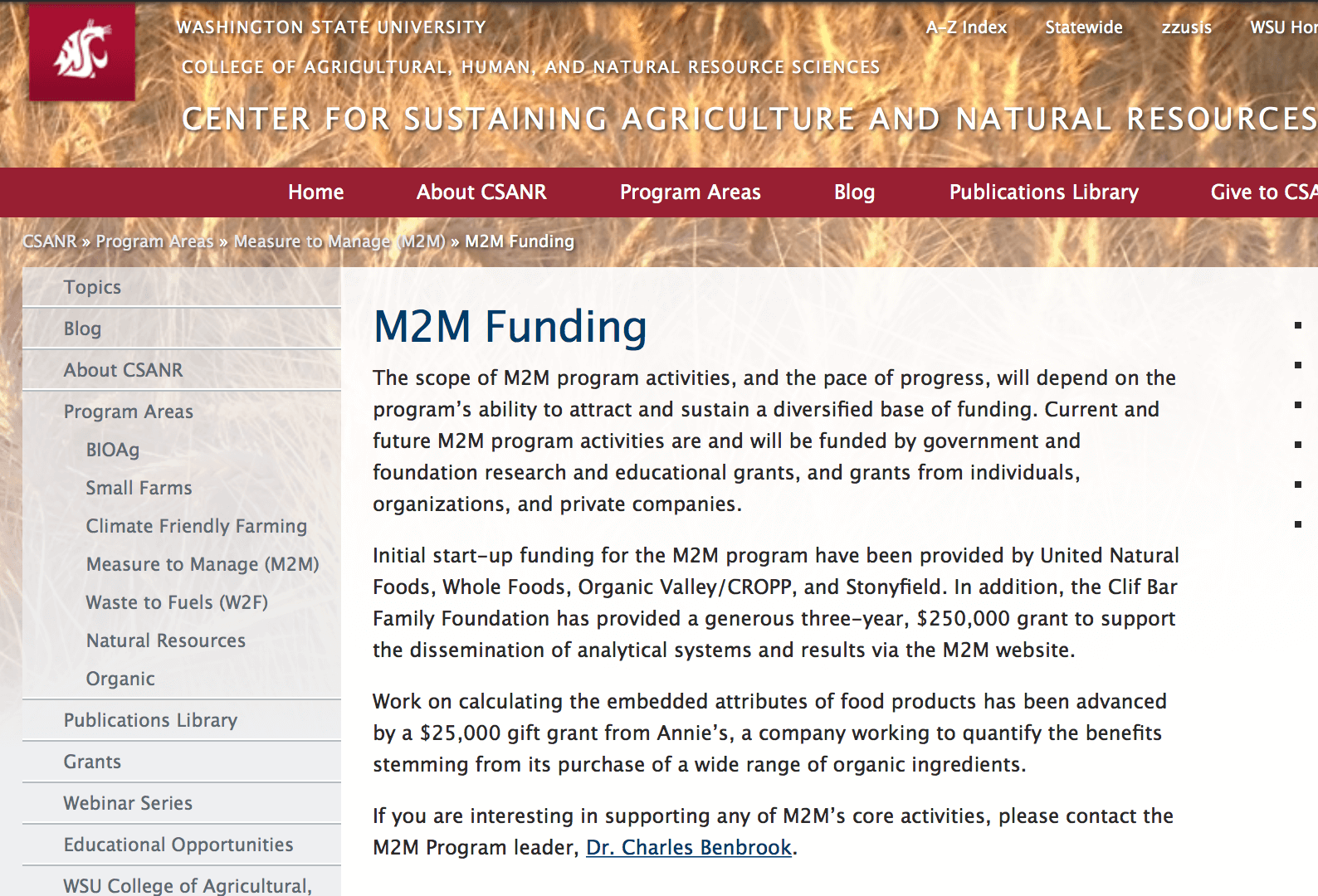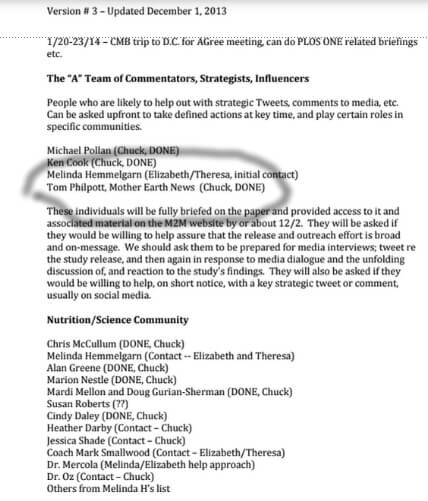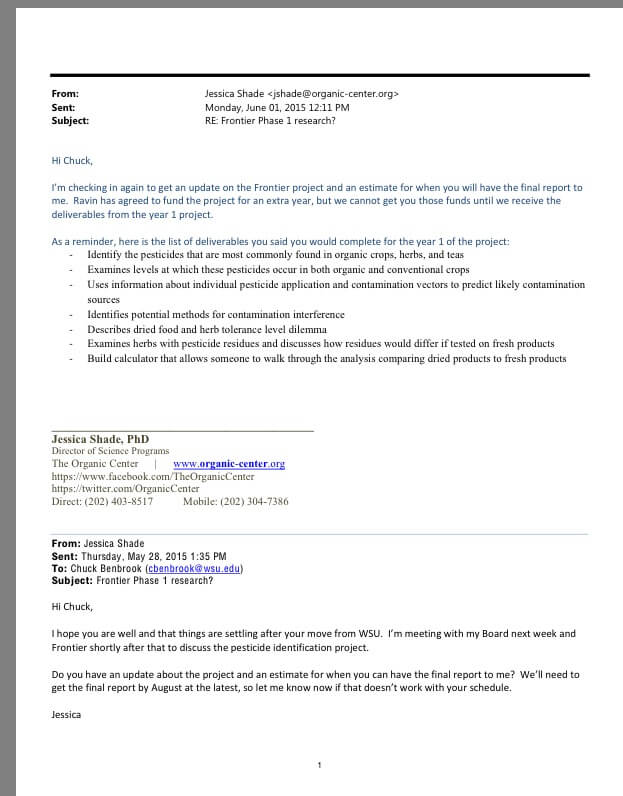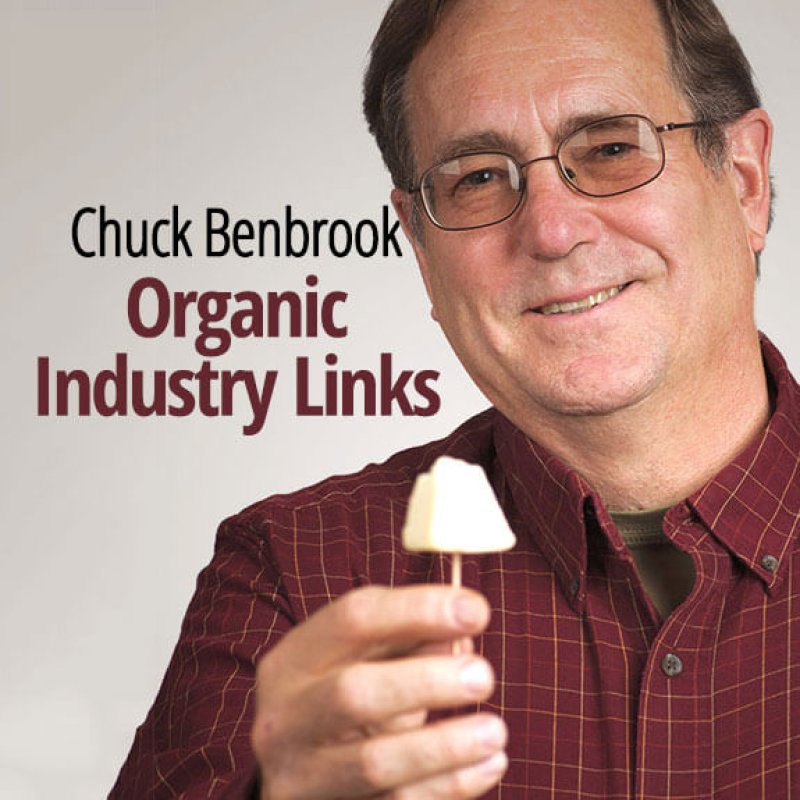“You are awesome. Wall Street is paying attention, too. Chipotle’s stock hit a record high last week when they announced they would have to raise prices to go non GMO. It’s up 44% on the year. Have spoken with Target and Nestle in the last week. Sending a hug to you, Chuck. You are such an inspiration and mentor to me. Thank you for all that you do.”
Robyn
Email from Robyn O’Brien to Charles Benbrook, October 29, 2013
This brief note—contained in the trove of emails posted by the New York Times last month about the ties between public scientists and the food industry—is perhaps the most revealing evidence yet about the tactics and ulterior motives behind the non-GMO movement. The Times released the emails in the wake of its publication of a September 5 article by Eric Lipton, “Food Industry Enlisted Academics in G.M.O. Lobbying War.” A separate FOIA led to the release of more of Benbrook’s emails, available here, which reaffirms his close ties to the organic industry that has bankrolled him for more than a decade.
Robyn O’Brien—the foodie world’s Erin Brokovich as she calls herself—is an anti-GMO, pro-organic activist. Charles “Chuck” Benbrook is an organic industry-funded consultant and former academic—100 percent of his research has been funded in recent years by the organic industry—whose repudiation of GMOs is frequently cited by organic companies, trade organizations and front groups. [GLP Benbrook profile available here]
What this specific email implies in just a few sentences is the following: Companies like Chipotle switch to some non-GMO ingredients then charge their customers higher prices, knowing they will pay more for what is perceived as healthier food. Wall Street might respond favorably to such a move because higher prices can mean higher profits and higher returns for investors. If Chipotle’s stock should continue to rise on the back of higher profit margins, anti-GMO activists will undoubtedly cite this as an example to convince other companies to go non-GMO so they could also justify raising prices on consumers in exchange for better profits and happy investors.
Now imagine for a moment that the word “Chipotle” was replaced with the word “McDonald’s.” And a prolific activist and a paid scientist had boasted about McDonald’s record stock price because it jacked up prices on McDonald’s customers to make more money for McDonald’s investors. And this same pair was in cahoots to use their high public profile to persuade other companies to follow suit and raise prices on their customers, too.
Michael Pollan, Tom Philpott and Marion Nestle wouldn’t be able to type fast enough to get that story out. Editorial boards, unions and politicians would be screaming for heads to roll.
But there’s a double-standard when covering the organic, non-GMO movement; never before has it been more evident than over the last several weeks as a treasure trove of emails has emerged from the “independent” scientist whose research is the very lynchpin of the anti-GMO case. While reporters eagerly seized on emails between biotech and public scientists (and even between scientists and this website) to try and create an air of a nefarious scheme, they missed the far bigger story about the Chuck Benbrook email cache.
The Benbrook emails show shrewd collaboration between various facets of the organic and anti-GMO movements to promote and perhaps even buy questionable science about the supposed benefits of organic and dangers of GMOs. The “science” is buttressed by the credibility of an organic industry-funded academic as part of a calculated effort to influence the media, voters and consumers in the name of expanding organics’ market share and bottom line. And to-date, it’s been an overwhelmingly successful strategy.
Benbrook background
Chuck Benbrook, an agricultural economist with no training in plant genetics, has for more than two decades been the face of organic movement claims that organic food is “safer” and “healthier” than conventional foods. He served from 2004-2012 as Chief Scientist for The Organic Center, which is funded by the organic industry and is now officially part of the Organic Trade Association. He then moved to Washington State University, joining the Center for Sustaining Agriculture and Natural Resources as an adjunct research professor—a job funded entirely by the organic industry with no funding support from any independent or university sources. According to the CSANR website, but since removed [but available here]:
Benbrook was officially severed from CSANR and Washington State University in May, 2015,
Benbrook’s best-known study—published in 2012 shortly after he joined WSU—concluded that genetically modified foods have resulted in increased pesticide use, purportedly because weeds are developing resistance to glyphosate, resulting in so-called “superweeds.” He wrote: “Resistant weeds have become a major problem for many farmers reliant on GE crops, and are now driving up the volume of herbicides needed each year by about 25%.” This study catapulted Benbrook to the top of reporters’ contact list about GMOs and made him the scientific darling of the non-GMO, pro-organic movement.
NY Times emails
There are now two releases of Benbrook’s emails; both reaffirm his close ties to the industry that has bankrolled him for more than a decade. They include his demands for financial support for ‘research on request. The emails also reveal the ties between Benbrook and other anti-GMO campaigners, such as GMO labeling lobbyists, journalists and authors unstintingly critical of GMOs, such as Michael Pollan and Tom Philpott.
The Times posted just a tiny sampling of the emails it received under an open records request, but it’s enough to construct a well-coordinated effort between Benbrook and the non-GMO movement on several fronts. The comments in bold are direct commentaries from the Times that accompanied the release of the Benbrook correspondence. They are followed by a synopsis of the relevant emails:
NYT: “Just as agricultural biotech giants recruit academics to help block mandatory labeling, the organic foods industry does the same.”
Benbrook had been very active in promoting mandatory labeling of GMOs, including Washington’s failed labeling initiative (I-522) in 2013. Major benefactors pushing for passage of I-522 included Stonyfield Organic, Amy’s Kitchen, Annie and Nature’s Path as well as advocacy groups such as the Organic Consumers Association, Center for Food Safety and the Environmental Working Group.
In response to one email from the coalition’s PR firm seeking to generate publicity just days ahead of the vote, Benbrook replied: “I had hour+ interview with both “The Economist” and the Washington Post, with reporters who seemed much more open-minded than most in WA. Holding my breathe (sic) re the stories, I was pretty “out there.”
A few days later, the Washington Post published an article by Brady Dennis entitled “Washington state fight over GMO labeling is expensive and polarizing.” Dr. Benbrook is quoted several times in the piece as a supporter of I-522.
Charles Benbrook, a Washington State University agricultural researcher, said the activists pushing for labeling are trying to fill a void left by Congress and federal regulators, who have yet to seriously consider a national labeling system.
“This is an incredibly important vote,” Benbrook said. “Passage of I-522 will set the country on a different and hopefully more constructive path of dealing with some of these underlying tensions.”
Note how the reporter presented Benbrook as if he was an independent commentator and does not mention his research on this issues were 100% paid for by the organic industry.
When asked what would happen if voters rejected the labeling proposal, Benbrook replied: “Almost certainly, the gloves are going to come off for the next round. And the poor public is going to just get more confused.”
The month before the election, Benbrook released a letter from a group of European activist scientists and NGO leaders seeking to refute the claim of scientific consensus behind GMO safety. Benbrook is quoted in a Seattle Weekly Times article about the statement, acknowledging “that I-522 was one motivation for the statement, which was several months in the works.” The statement that Benbrook helped organize contends that “the claim (of consensus) encourages a climate of complacency that could lead to a lack of regulatory and scientific rigour and appropriate caution, potentially endangering the health of humans, animals, and the environment.”
NYT: “Dr. Benbrook’s research quickly becomes a central talking point for organizations that have advocated mandatory labels on genetically modified foods, including the nonprofit group Just Label It, which is primarily backed by organic foods companies, which stand to benefit if the label mandates are approved.”
Just Label It, the GMO labeling front group led by Stonyfield Chairman Gary Hirshberg, often engaged Benbrook and quoted his research extensively, including his study about the rise in “superweeds” due to GM crops. A Just Label It PR paper repeatedly cited Benbrook as a source:
Gary Hirshberg also quoted Benbrook as a definitive source on the dangers of GMOs and conventional agriculture in a letter to the editor to the New York Times after the paper editorialized against mandatory labeling of GMOs in March 2013:
Despite assurances to Congress and regulators over the last two decades that crops engineered to be herbicide resistant would lead to less chemical usage, a peer-reviewed paper published last summer by Washington State University professor Dr. Charles Benbrook showed that the three major GE crops in the U.S. – corn, soybeans, and cotton – have increased overall herbicide use by more than 527 million pounds between 1996 – 2011, compared to what it likely would have been in the absence of GE crops.
Putting aside the fact that Hirshberg’s statement is entirely misleading—the toxic level of chemicals has decreased markedly as the result of both herbicide tolerant and Bt GMO crops since 1996—the research itself was conducted entirely with funding from the organic industry–disclosures not made by Benbrook or Hirshberg or the organic supporters in the media like Pollan and Philpott who regularly and favorably cite Benbrook’s “independent” research as definitive.
This year, Benbrook worked closely with Hirshberg’s Just Label It in the lead-up to Congress’s vote on HR 1599, the Safe and Affordable Food Labeling Act, which is strongly opposed by the organic industry. He participated in a panel discussion hosted by Just Label It in Washington on July 8, just two weeks before the crucial vote, alleging the dangers of glyphosate, the active ingredient in Monsanto’s Round-Up herbicide. Benbrook cited his 2012 study—which we now know was coordinated by and for the organic industry and supported by undisclosed organic industry money—that made the claim, challenged by many independent scientists, that GMOs have resulted in an increase in the use of highly toxic pesticides, and claimed that “at some point, the cost to farmers and the environment is going to become intolerable.”
HR 1599 was approved by the house two weeks later by a vote of 275-150.
NYT: “…Dr. Benbrook, even while at Washington State, continued to work closely with organic food industry players, such as Organic Valley, the popular brand of a large milk cooperative, and the Organic Center, an industry-funded group.”
Weeks after the defeat of Washington’s GMO labeling proposal, the movement was looking to quickly regroup. “Really important to craft the right message post-vote, because this is a marathon and the beat will go on,” Benbrook wrote in an email to I-522 funders. He would play a crucial role in pivoting the message back in their favor with the release of a new, much disputed PLOS One journal article--“Organic Production Enhances Milk Nutritional Quality by Shifting Fatty Acid Composition: A United States–Wide, 18-Month Study,” claiming organic milk is healthier than regular milk.
According to the emails, Benbrook and his allies carefully crafted a media blitz with Benbrook as the central figure. Organic Valley, the leading source of organic milk in the country whose clients including Stonyfield, prepared a timeline for media outreach that even included Benbrook’s surgery and vacation schedule. “Contact information key players” were listed as Benbrook, the PR director for Organic Valley, a contact at the Science Communication network and a science writer at Washington State Magazine.
In one email, Benbrook indicated a “very good 1 hr on phone with Ken Chang, NYT.” Five days later, Chang posted a lengthy article on Benbrook’s study with the headline “More Helpful Fatty Acids Found in Organic Milk.” It included the line: “Whole milk from organic dairies contains far more of some of the fatty acids that contribute to a healthy heart than conventional milk, scientists are reporting.” Benbrook was quoted frequently, including an unproven claim that drinking organic milk “will certainly lessen the risk factor for cardiovascular disease.” (Benbrook is not a physician and has no medical training.)
The article did acknowledge that “The company (Organic Valley) provided $45,000 for an independent laboratory to measure the fatty acids, and it is a corporate sponsor of Dr. Benbrook’s program at Washington State. The university spent $90,000 to analyze the data and prepare the paper for publication.”
But there is no mention by Chang that Benbrook had spent the previous decade as a spokesperson on behalf of the organic industry, for which he also consults, and that his entire research program at WSU was bankrolled by the organic industry. In fact, Chang all but dismissed the conflict of interests as relevant, claiming “experts not connected with the study said the findings were credible—though they noted that the role of milk in a healthy diet and the influence of fatty acids in preventing or causing cardiovascular disease are far from settled.”
Benbrook lobbies journalists to manipulate coverage of pro organic milk study
A review of the FOIA’d emails finds that Chang—along with Philpott, OCA, Stonyfield, Dr. Oz, Marion Nestle and other journalists, professors and special interests groups—were cited by Benbrook and the PR operative from the organic industry who he worked closely with as targets for a coordinated roll-out of the journal article (the very practice that Philpott for one decried in a recent piece in Mother Jones alleging industry ties to the GMO seed industry.)
Benbrook and organic company representatives personally lobbied his “A-Team” with the hope they would present favorable coverage of his study and ignore his long ties both to them and to the organic lobbyists who funded his research. The activist media amped the story, with reports that read like organic industry news releases. In Mother Jones, Tom Philpott cited the Benbrook study as “proof” of the superiority of organic foods and Grist concluded, “Organic milk is better for your heart.” The storyline was also promoted by the Organic Consumers Association, Stonyfield Organic and other companies and organizations set to gain financially from this news.
In fact, independent scientists with no ties to the organic industry were sharply critical of the Benbrook study. Rossi Filippo, a nutritionist with the Institute of Food Science and Nutrition at the Catholic University of the Sacred Heart in Milan, pointed out that the omega-6 to omega-3 ratio should be calculated considering the whole diet, not only with one food. But the problems with the study go far beyond poor math. While some scientists argue that higher ratios of omega-6 to omega-3 lead to greater health risks, Dr.Walter Willett, chairman of the nutrition department at the Harvard School of Public Health said that’s a “false assumption.” The consensus research shows omega-6s are actually associated with a lower risk of heart disease. Health conscious consumers should eat more of both kinds of fatty acids—directly contradicting a central assumption in the Benbrook study and Chang’s endorsement.
Other scientists were concerned about the crude way Washington State and Benbrook promoted the research–at a cost of more than $125,000 supplied by the organic industry, according to emails. Benbrook and the PR team framed his study as a breakthrough, a theme echoed widely in news stories, and even by the New York Times. Chang called it “the most clear-cut instance of an organic food’s offering a nutritional advantage over its conventional counterpart.”
In fact, study after study— thousands of them, with the 237 considered most pertinent summarized in a meta-analysis by a team at Stanford University published in 2012—have found “little evidence of health benefits from organic foods.” The American Academy of Pediatrics and the Mayo Clinic, among dozens of organizations, have said organic foods offer no nutritional advantages over conventional foods, and the National Dairy Council, which represents organic and conventional farmers, states there are no unique benefits from organic milk. None of that background information was included in the Chang report.
This chain of events—a controversial scientific study, a coordinated media campaign with the author as the central contact and PR leader, orchestrated and funded by an organic company that stands to profit from the study’s results, all yielding favorable media coverage—far outweigh any machinations, still unproven, between biotech scientists and the industry.
NYT: Dr. Benbrook also joins an effort with other academics to challenge a plan to approve a new Dow Chemical product for use with genetically modified crops. This letter then becomes part of the advocacy effort by Just Label It. Again, the industry-backed group is using third-party scholars as a lobbying tool.
Benbrook’s activism also extended to the federal government. On June 30, 2014, Benbrook is a signatory to a letter addressed to U.S. EPA Administrator Gina McCarthy asking the agency to refuse to “register a double herbicide mix of 2, 4-D and glyphosate (the “Enlist Duo weed killer) for farm field spraying in combination with a new breed of genetically engineered corn and soybeans.”
The letter purported that the move would “put public health at risk if sprayed on millions of acres of cropland” and cited a 1996 study that 2,4-D causes suppressed immune function and a 1991 study that it causes lower sperm count.
The letter is signed by several university professors. A small disclaimer at the bottom of the document says “the signers of this letter have done so in their personal capacities. Institutional affiliations are provided only for identification purposes and do not imply any institutional position.”
The Benbrook emails also highlighted other conflict of interests concerns such as his admitted failure to disclose his ties to the organic industry in an opinion piece co-authored with activist physician Philip J. Landrigan, and published by the New England Journal of Medicine that was sharply critical of GMOs and herbicides. Here are two of Benbrook’s clear misrepresentations in replies to the NEJM’s COI questions:
Did you or your institution at any time receive payment or services from a third party (government, commercial, private foundation, etc.) for any aspect of the submitted work (including but not limited to grants, data monitoring board, study design, manuscript preparation, statistical analysis, etc.)?
Answer NO
Are there other relationships or activities that readers could perceive to have influenced, or that give the appearance of potentially influencing, what you wrote in the submitted work?
Answer NO
Both Benbrook and his co-author, Philip Landrigan are board members, advisors and/or paid consultants to numerous organic activist groups and organizations, information both unethically withheld from NEJM).
A separate email from the Organic Center reiterating their expected “deliverables” from him on a pending study last year—deliverables of a still-to-be-done research that the Organic Center, an arm of the Organic Trade Association, was confident would produce the data to support its predetermined narrative that organic foods are safer than conventional foods:
In a broader sense, the emails confirm what consumers fear most; food industry special interests conniving behind the scenes to promote their agenda, boosting profits at the expense of a trusting public. This is nothing new in the annals of American capitalism. What’s unique here is that the offending industry is widely and inaccurately portrayed in the media as the white hat Davids fighting agri-business black hat Goliaths. The emails suggest much the opposite. While there has not been a shred of evidence from the FOIA’d emails suggesting that any professor received funding from seed companies, the very centerpiece of the organic research industry has been corrupted for more than a decade — but hidden from public view. Why does the organic industry get a pass–protected by a fake health halo and a sanctimonious do-gooder narrative. Where are the critical journalists?
Julie Kelly is a food writer and cooking teacher in Orland Park, IL. She can be reached on Twitter @Julie_kelly2































